The USS Theodore Roosevelt transits the Gulf of Alaska, May 7, 2021, during Northern Edge, an exercise designed to improve joint combat readiness.
Providing up-to-date information, news and original content on American Military issues.
The USS Theodore Roosevelt transits the Gulf of Alaska, May 7, 2021, during Northern Edge, an exercise designed to improve joint combat readiness.
May 13, 2021 | BY David Vergun , DOD News
Peer competitors China and Russia are modernizing their militaries at an astonishingly rapid rate, much faster than the Defense Department, the vice chairman of the joint chiefs of staff said during a virtual address at the McAleese FY2022 Defense Programs conference.
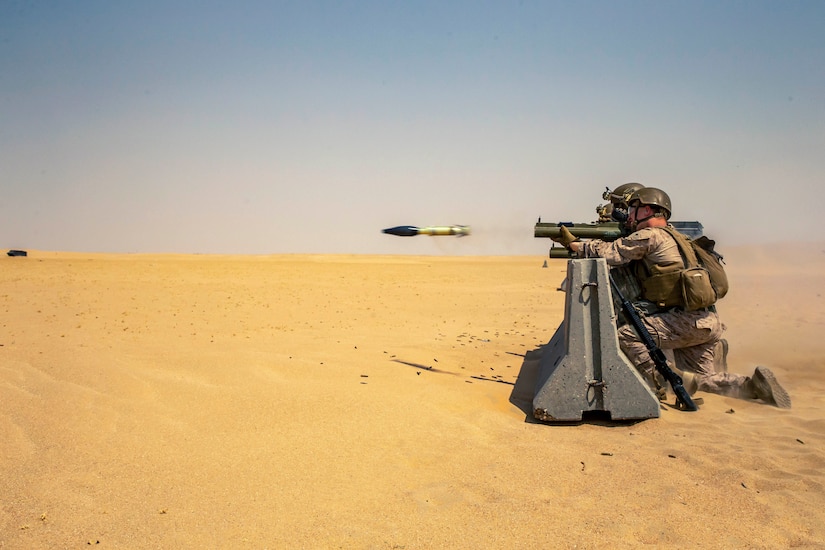
Acquisition is a particular area that needs more speed, he added.
With speed comes a certain amount of risk, he said.
The nature of warfare is changing in radical ways that create an enormous challenge and also an enormous opportunity, he said, mentioning unmanned air, ground and sea vehicles, artificial intelligence and machine learning.
Americans are the best in the world at innovation. If DOD leverages industry and academia talent, Hyten said he's confident that the department will excel in these and other areas.
Seamless integration of the joint force in all domains — sea, land, air, space and cyberspace — is also critical to deterring adversaries and winning wars, if necessary, he said.
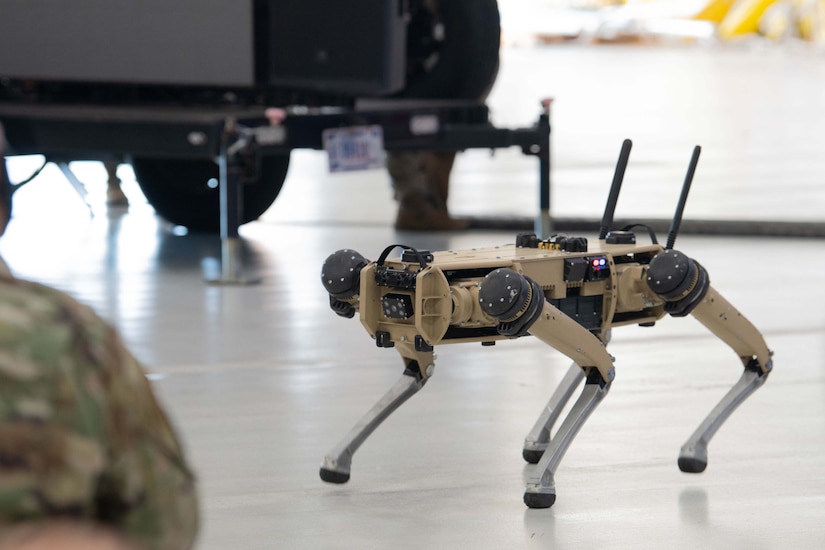
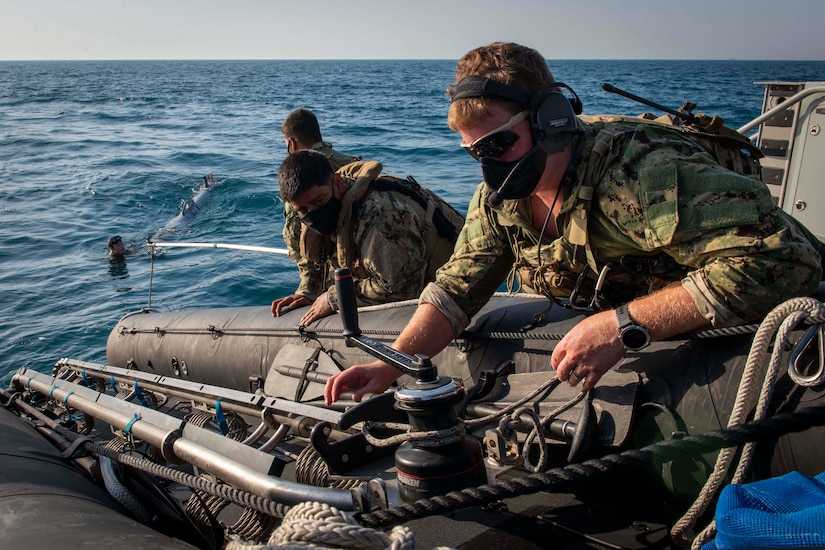
Improved integration with allies and partners also is critical, and a lot more work needs to be done in that area, he said.
Hyten also mentioned the importance of modernizing the nuclear triad, meaning submarines, bombers and intercontinental ballistic missiles that are capable of carrying nuclear weapons.
May 13, 2021 | BY David Vergun , DOD News
Army Col. Danielle Ngo said she encourages young people to consider serving, whether it be in their communities or in the military.
For as long as she can remember, Ngo said she wanted to be a soldier. Her path to that career started halfway around the world in South Vietnam.

In late April 1975, at age 3, Ngo said the world her family had known was collapsing around them as North Vietnamese forces began to overrun the defenses of Saigon, now called Ho Chi Minh City.
Her mother, Thai-An, and sister, Lan-Dinh, left their paternal grandparent’s Saigon home where they were visiting, for the Tan Son Nhat airport for evacuation. Ngo’s grandfather took eight short-distance buses and scooters from the seaside village of Vung Tau, where they all lived together, to take Ngo back to her mother because the South Vietnamese government had issued an off-limits restriction for traveling that week. He did not want them to be separated.

Ngo said they were among those eligible to be evacuated because her grandmother had worked at the U.S. Embassy in Saigon.
Ngo has only a few, vague recollections of the evacuation because she was so young at the time. As aerial bombs rained down on the airport, their airplane took off. Ngo said her mother told her it was most likely the last plane to leave. Unfortunately, her father wasn't on the evacuation flight. He stayed behind to fight, as he was a captain in South Vietnam's army. Many years later he emigrated to the United States.
Ngo's mother took her two daughters and settled in Massachusetts, living first in the town of Melrose and later in the towns of Malden, Hingham and Watertown.

Growing up, Ngo said her mom taught her all about the Vietnamese culture and how to make Vietnamese food, which she enjoys preparing even today.
At age 17, Ngo said she coaxed her mother to sign enlistment papers so she could serve in the Army Reserve.
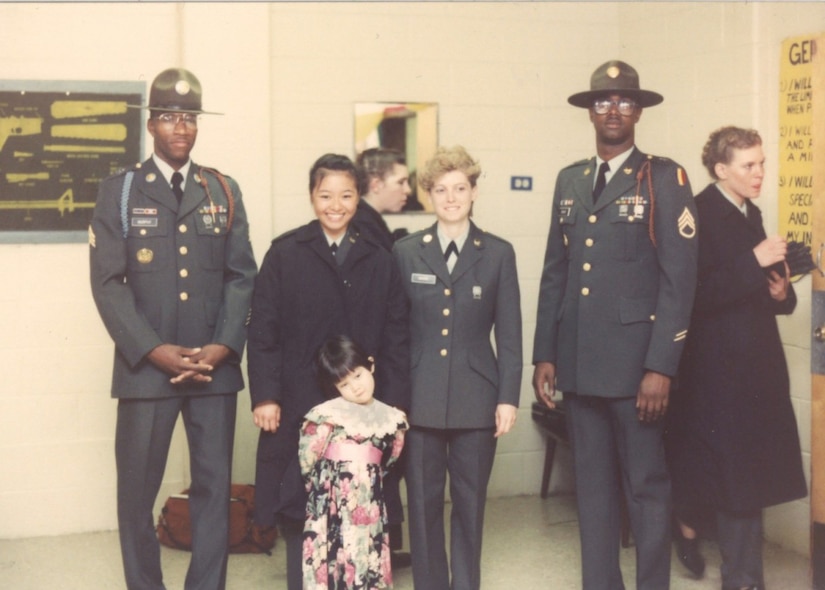
At 19, Ngo found out that her grandfather was sick in Vietnam, so she went to see him. It was the first of four trips she would take to Vietnam to see the country and visit relatives or travel for Army assignments.
The U.S. at the time had established diplomatic relations; today, Vietnam is a valued U.S. partner.
In 1994, Ngo graduated from the University of Massachusetts with a Bachelor of Science in finance and was commissioned a second lieutenant in the Army, serving in the U.S. Army Corps of Engineers.
Since then, Ngo has had many assignments, including in Bosnia, Iraq and Afghanistan. Her many decorations include a Bronze Star Medal with oak leaf cluster.
Navy Petty Officers 2nd Class Brandon Gibson and 3rd Class Isais Zepeda keep watch aboard the guided missile destroyer USS Barry during routine operations in the East China Sea, April 24, 2021.
The U.S. Department of Defense (DoD) and the Republic of Korea Ministry of National Defense (MND) held the 19th Korea-U.S. Integrated Defense Dialogue (KIDD) May 12-13, 2021 in Washington, D.C. Acting Assistant Secretary of Defense (ASD) for Indo-Pacific Security Affairs, Mr. David Helvey, and Deputy Assistant Secretary of Defense (DASD) for East Asia, Dr. Siddharth Mohandas, led the U.S. delegation. The ROK delegation was led by Deputy Minister for National Defense Policy (DEPMIN), Mr. Kim Mangi. Key U.S and ROK defense and foreign affairs officials also participated.
During the KIDD, both sides reaffirmed a shared goal of achieving the complete denuclearization of, and lasting peace on, the Korean Peninsula and pledged that U.S. and ROK combined forces would remain ready and postured to defend the ROK. Additionally, they affirmed the importance of full implementation of relevant UN Security Council Resolutions by the international community, including North Korea. The two sides also concurred that continued enforcement and management of the Armistice Agreement by the United Nations Command (UNC), and implementation of the inter-Korean Comprehensive Military Agreement contributed to stability and peace on the Korean Peninsula.
The U.S. and ROK sides noted the significant strides made on the transition of wartime Operational Control (OPCON) to the Future Combined Forces Command (F-CFC) and reaffirmed their mutual commitment to the Conditions-based OPCON Transition Plan (COTP). As part of this, the U.S. and ROK delegations pledged to continue efforts to comprehensively conduct a joint study on the COTP capabilities, solidify bridging and enduring capabilities, and also discussed the way forward for wartime OPCON transition to the F-CFC, including the future certification assessment for Full Operational Capability (FOC). The two sides agreed that the conditions stated in the mutually agreed COTP must be fully met before the wartime OPCON is transitioned to the F-CFC. The ROK also noted that it will acquire and develop critical military capabilities and committed to robust discussions on ROK acquisition planning.
Both sides reaffirmed that the U.S.-ROK Alliance remains the linchpin of peace and security in Northeast Asia, as well as the Korean Peninsula, and further expressed their commitment to maintaining the rules-based, international order, and pursuing cooperation between the U.S. Indo-Pacific Strategy and the ROK New Southern Policy. DASD Mohandas and DEPMIN Kim underscored the importance of maintaining a combined defense posture that is ready to “fight tonight,” and they reiterated the importance of maintaining joint readiness against all shared threats to the Alliance through combined training and exercises. Both sides also concurred on the importance of establishing stable access to training facilities, resources, and other sites critical to the combined defense posture and pledged to deepen cooperation in various fields, including defense security cooperation, space policy, and cooperation on capacity building in Southeast Asia. Furthermore, the two sides affirmed a continued commitment to trilateral security cooperation, and committed to seek a near-term trilateral ministerial to enhance cooperation.
Both sides shared assessments on recent North Korean nuclear and missile threats, and pledged to monitor the North Korea situation while closely coordinating. The U.S. reaffirmed its continued commitment to provide extended deterrence using the full range of U.S. capabilities, including nuclear, conventional, and missile defense capabilities. The ROK committed to continue to acquire military capabilities to strengthen holistic Alliance readiness in response to North Korean nuclear and missile threats.
Finally, both sides assessed that the 19th KIDD reaffirmed the close bonds of the Alliance, bolstered bilateral coordination toward the complete denuclearization of the Korean Peninsula, and strengthened U.S.-ROK combined defense posture. The U.S. DoD and the ROK MND will hold the 20th KIDD in Seoul, Republic of Korea, at a mutually appropriate time in the second half of 2021.
May 13, 2021 | BY David Vergun , DOD News
Peer competitors China and Russia are modernizing their militaries at an astonishingly rapid rate, much faster than the Defense Department, the vice chairman of the joint chiefs of staff said during a virtual address at the McAleese FY2022 Defense Programs conference.

Acquisition is a particular area that needs more speed, he added.
With speed comes a certain amount of risk, he said.
The nature of warfare is changing in radical ways that create an enormous challenge and also an enormous opportunity, he said, mentioning unmanned air, ground and sea vehicles, artificial intelligence and machine learning.
Americans are the best in the world at innovation. If DOD leverages industry and academia talent, Hyten said he's confident that the department will excel in these and other areas.
Seamless integration of the joint force in all domains — sea, land, air, space and cyberspace — is also critical to deterring adversaries and winning wars, if necessary, he said.


Improved integration with allies and partners also is critical, and a lot more work needs to be done in that area, he said.
Hyten also mentioned the importance of modernizing the nuclear triad, meaning submarines, bombers and intercontinental ballistic missiles that are capable of carrying nuclear weapons.
May 13, 2021
Pentagon Press Secretary John Kirby provided the following readout:
Under Secretary of Defense for Policy Dr. Colin H. Kahl, met with Israeli Minister of Defense Director of Policy and Political Military Affairs Zohar Palti at the Pentagon today to discuss the U.S.-Israel defense partnership and opportunities for strengthening bilateral cooperation. The leaders also discussed the recent rocket attacks emanating from Gaza.
Under Secretary Kahl unequivocally condemned the terrorist attacks directed at Israeli civilians and underscored U.S. support for Israel’s right to self-defense. They agreed to maintain a close dialogue and to work together to strengthen regional security.
Dr. Kahl underscored the Department’s enduring support for Israel’s security and Qualitative Military Edge, and conveyed the Administration’s support for a restoration of calm and protection of civilians.
May 13, 2021 | BY Terri Moon Cronk , DOD News
The secretary of defense has been clear that modernizing the military is a key component of how the Defense Department defends the nation, Deputy Defense Secretary Kathleen H. Hicks said this week after spending a day at Army Futures Command in Austin, Texas.
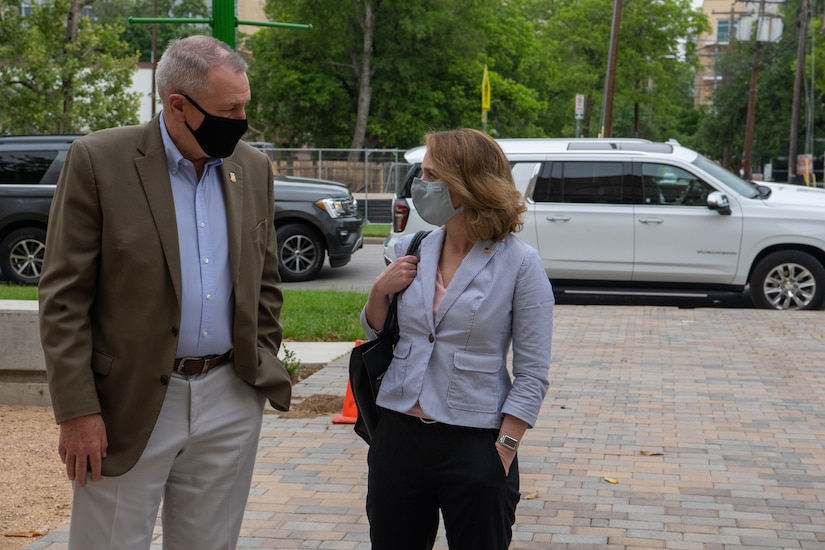
Hicks' trip focused on the DOD's innovation and modernization efforts and use of best practices to put new technology in the hands of the warfighter.
In modernizing the total force, Hicks' job is to help Secretary of Defense Lloyd J. Austin III move strategy to application, she said, explaining that line runs directly through concept development, capabilities, force design and eventually resourcing. "That's what Army Futures Command is all about for the Army, so it helps me significantly to be able to come down here and see what part the Army is trying to play in helping move to execution through those same key lines," she said.
In addition to meetings, briefings and visits with Army Gen. John. M. Murray, AFC commanding general, Hicks saw the collaboration between the Army and academia at the AFC Software Factory and the AFC Applications Lab.
Public-private partnerships are critical to modernizing the force, she emphasized. "[They're] even more critical today because so much of the investment in ecosystems around innovation is happening outside of the government sector, so it increases the need for DOD to make sure it's [the Defense Department] part of that broader innovation ecosystem," Hicks said.
DOD has been taking ideas and concepts that are critical for military needs and helping transition them to solutions for about a decade. "But I think we're just starting to really see the seeds germinate around how we do it," she added.
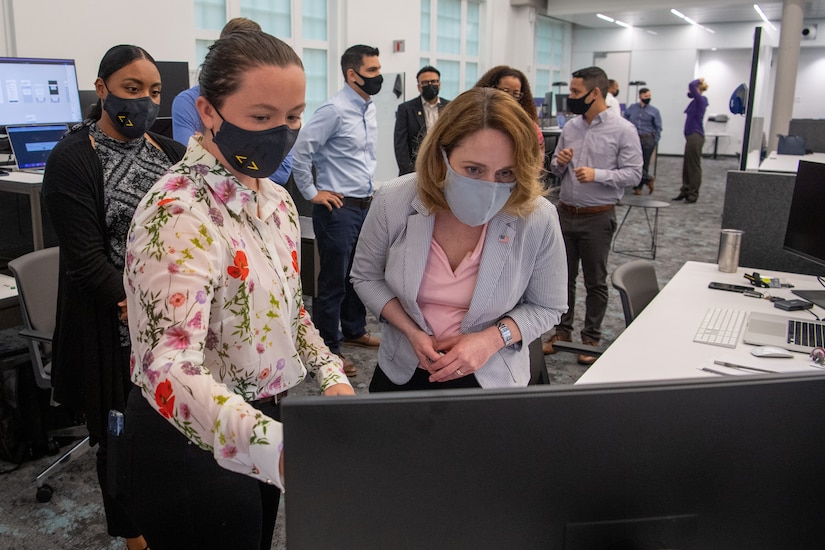
The deputy secretary said she witnessed excitement and passion as she watched Austin Community College software lab students work and learn collaboratively with soldiers to find solutions to software issues. Software developers must be agile and able to jump from problem to problem, she added.
It's significant to have a resource such as academia pulled into a traditional military hierarchy if the collaboration yields software solutions, Hicks said.
"I think, at the corporate enterprise level, what we're trying to focus on is learning more about the great ideas that are out there — of which there are many — and [AFC] is one of them," she said.
It's important, she added, to bring ability and transparency to modernization and innovation efforts and create more of an ecosystem from the enterprise level. That makes it easier for policy-making customers to understand what's available and quickly leverage it.
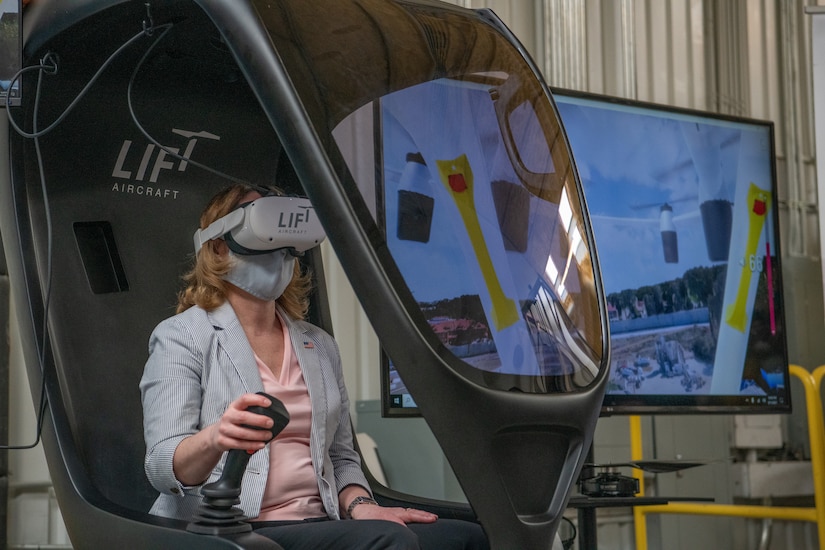
The deputy secretary said DOD wants to pull up those good ideas and see what's working at the corporate enterprise level. From there, she said DOD can think about whether major policy and authority changes are needed and whether there are incentives.
"That's the piece where I think I can provide the most sum on the scale," she said. "How do you change the incentives around everything from promotions to how budgets are determined and those sort of major levers that help you shift culture over time? In a way, that's supportive of innovation, and we're just at the beginning of that journey."
Murray said a strength of AFC's Applications Lab is that it starts with the problems that need to be solved for the Army. "We struggled for a long time trying to figure out the sweet spot for [AFC's Applications Lab], and I think we have stumbled upon something," he said.
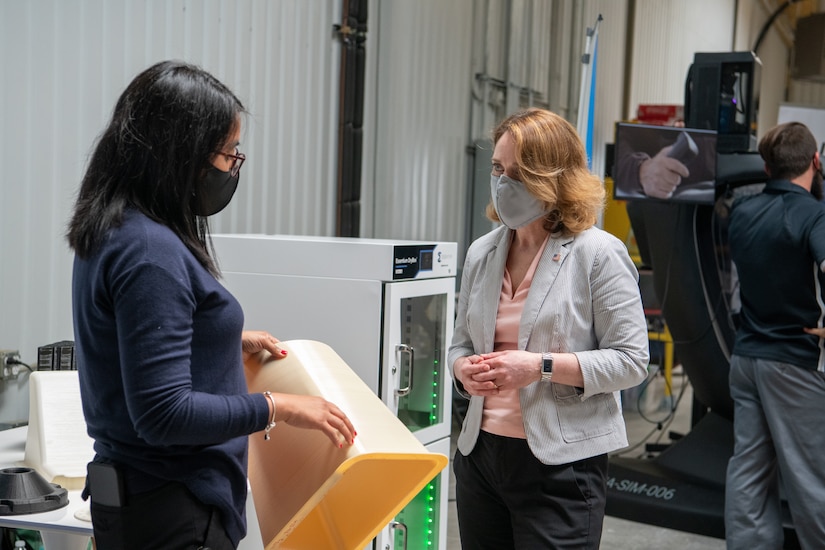
Being able to describe that problem so the average person can understand it — without acronyms and very simply — also fosters innovative thinking.
"We end up with some decent products, but I'm really interested in expanding the way we think about problems, and I think just the conversations we have with people who think differently about how to solve problems is probably the biggest benefit we’re going to get," the general said.
Ultimately, AFC is trying to solve problems for the soldiers in the field today, and it's important to keep them involved in the process, Murray explained.
"But as you start to think about some of the research and development investments, it's that soldier who's in fourth-grade right now who will be a soldier in the future. So, we're not only keeping today's soldiers but future soldiers in mind as we begin to solve some of these [challenges]," he said.
May 13, 2021
Today, the Department of Defense (DOD) released the Fiscal Year 2020 Annual Report on Sexual Assault in the Military. This recurring annual report, published by DOD’s Sexual Assault Prevention and Response Office.
This year’s Annual Report on Sexual Assault in the Military, which is required by Congress annually, provides FY 2020 reporting data, case dispositions, and updates to initiatives the Department executed throughout the year – including during the pandemic. Of note, the reporting data is separate from estimated prevalence. The report does not contain sexual assault prevalence survey results, which DOD uses to scientifically estimate the number of military personnel impacted by the crime. The national pandemic forced the Department to postpone its biennial survey to FY21.
“Sexual assault is an abhorrent violation of an individual’s basic dignity. Over the last 15 years, the Department has enacted new policies and built new infrastructure to address sexual violence, including an integrated violence prevention approach developed in consultation with subject matter experts,” said Dr. Elizabeth Van Winkle, Executive Director of the Office of Force Resiliency. “However, the programs and policies we put into place will not be effective unless every military member and leader – at all levels – comply with our policies and embody the values we espouse. As directed by Secretary of Defense Lloyd Austin, the Department is taking immediate actions to not only counter these corrosive behaviors, but also provide better visibility on the ground to ensure all members are doing their part to eliminate these behaviors.”
DOD authorities receive reports of sexual assault involving service members as victims and/or alleged perpetrators. This year, of the total 7,816 reports received by DOD in FY20, 6,290 involved allegations from Service members for incidents that occurred during military service. This is up by 1 percent from the 6,236 Service member reports received in FY19. Reports from civilian victims and service members reporting a pre-service incident decreased this year. The Department encourages greater reporting to connect victims with restorative care and to hold offenders appropriately accountable.
The pandemic did not deter the Department from providing support to Service members seeking help. Sexual Assault Response Coordinators, Victim Advocates and other response team members quickly pivoted to virtual encounters and other such means to render assistance and connect victims with supportive care. In addition, the Department’s Safe Helpline experienced a 35 percent increase in users seeking to connect with needed resources, information, and support.
The Department continues to address sexual assault holistically by advancing prevention, addressing problematic culture, improving the skills of leaders at all levels, and evaluating ways to make reporting of sexual assault easier and safer for victims.
“DOD leadership is committed to providing the men and women who defend this country with workplaces where dignity and respect, and inclusion are the norm,” said Maj. Gen. Clement Coward, director of the DOD’s Sexual Assault Prevention and Response Office. “While some progress has been made to achieve that goal, we must do more to prevent this crime. We look forward to the recommendations forthcoming from Secretary’s Independent Review Commission. We will take decisive action to implement every recommendation accepted by the President and the Secretary.
The Fiscal Year 2020 Annual Report on Sexual Assault in the Military and a fact with the topline results can be found on the DoD Sexual Assault Prevention and Response Office website at www.sapr.mil.
This report is separate from ongoing work of the Independent Review Commission.
The amphibious assault ship USS Iwo Jima, right, the fast combat support ship USNS Supply and the Royal Navy landing platform dock ship HMS Albion conduct a replenishment in the North Sea, May 9, 2021.
The acting secretary of the Navy and chief of naval operations announced today the following assignments:
Rear Adm. (lower half) Heidi K. Berg will be assigned as director, plans and policy, J5, U.S. Cyber Command, Fort Meade, Maryland. Berg is currently serving as director, J2, U.S. Africa Command, Stuttgart, Germany.
Rear Adm. (lower half) John A. Watkins will be assigned as deputy director, command, control, communications and computer systems and information technology, J6, U.S. Space Command, Peterson Air Force Base, Colorado. Watkins is currently serving as deputy commander, Tenth Fleet, Fort Meade, Maryland.
Capt. Stephen G. Mack, selected for promotion to rear admiral (lower half), will be assigned as deputy chief of staff, submarines, Maritime Command Headquarters Command; and commander, submarines, NATO, Northwood, United Kingdom. Mack is currently serving as chief of staff, Submarine Force, U.S. Atlantic Fleet; and chief of staff, U.S. Strategic Command Special Activities Atlantic, Norfolk, Virginia.
A soldier looks out from the back of an Army CH-47 Chinook during Northern Edge over Alaska, May 10, 2021. The exercise is designed to improve joint combat readiness.
Air Force Senior Airman Zachary Reddick, an aerospace medical technician with the 62nd Medical Group, Arizona Air National Guard, applies a bandage after administering the COVID-19 vaccination to a service member at Davis-Monthan Air Force Base, Tucson, Ariz., May 6, 2021. The Arizona National Guard is partnering with active-duty components to surge capacity and capability in providing vaccinations to service members and their dependents.
Army Pvt. Alyssa Hovland, a combat medic with the 996th Area Support Medical Company, administers the COVID-19 vaccination to a tribal member of the Tohono O’odham Nation in Why, Ariz., May 11, 2021. The Arizona National Guard partnered with the tribe to provide vaccinations and to also act as translators for the predominantly Spanish-speaking community.
Air Force Tech Sgt. Brandon Poston paints the engine cowling door of a C-146A Wolfhound at Duke Field, Fla., April 10, 2021.
Marine Corps Sgt. Elizabeth Adams participates in a cleanup event in Okinawa, Japan, May 7, 2021. The Single Marine Program hosted the event to help strengthen the U.S.-Japan alliance.
Army Spc. Aiden Carroll crawls onto the beach during the Region VI Best Warrior Competition at Camp Rilea, near Warrenton, Ore., May 7, 2021.
May 13, 2021 | BY Jim Garamone , DOD News
Van Winkle testified before the Senate Armed Services Personnel Subcommittee. Her office handles some of the thorniest issues confronting defense, including sexual assault, harassment, diversity and inclusion, and suicide prevention.
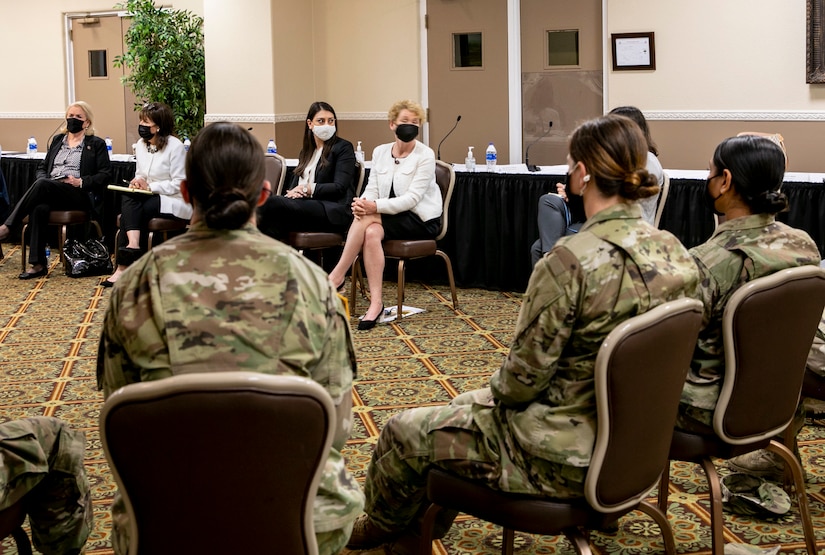
Van Winkle used the findings of the Fort Hood Independent Review Commission as a basis for much of her opening statement. The report – commissioned by then-Army Secretary Ryan D. McCarthy following the murder of Army Spec. Vanessa Guillen – was an indictment of culture of the Army base that allowed sexual assault and harassment to continue.
"Points of failure in the system, as reflected in painstaking detail within the pages of the Fort Hood report will consistently undermine all of our actions if not addressed," Van Winkle said. "At Fort Hood, and likely other installations, there was a culture of disrespect and purposeful degradation of others that was unimpeded and left unchecked by the very individuals who hold the responsibility to prevent this type of culture."
This neglect left many asking if military leaders were blind to these infractions or whether they were complicit, she said.
In 2019, DOD introduced strategies and policies to address sexual assault as part of an integrated violence prevention framework. The framework aims to prevent all forms of harm and looks to ensure an inclusive environment for all who serve. "I truly believe that an integrated violence prevention approach with a focus on command climate is how we can best prevent these behaviors," Van Winkle said. "It must be emphasized that anything we have put into place, or will put into place, will be ineffective if members of our military fail to proactively embody the values that we expect."
Van Winkle said changing a command climate or the command culture requires the commitment of all members of a community. "No one gets a pass; no one gets to decide they don't have a role to play," she said. "When you join the military, you are taking on a responsibility to uphold our values and to be a part of a team that rejects these behaviors."
This is even more critical for leaders. "When you become a leader at any level, … you take on a critical responsibility, both when it is easy and when it is not," she said. "This means calling out behaviors that are not in line with our expectations, even if they are perpetrated by a friend."
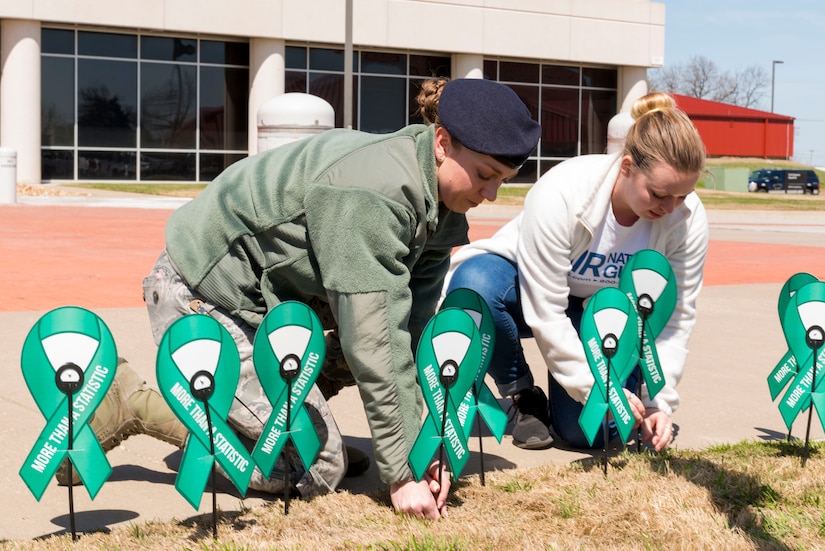
Van Winkle said leaders who overlook these behaviors erode trust. "Looking the other way allows harm when it otherwise didn't exist," she said. "Every time you fail to address misconduct – even the smallest offensive jokes and comments – someone is watching you, and trust is either gained or it is lost. And once it is lost, you will not easily recover it."
Leaders need to understand that words like protect, defend, dignity, respect and discipline are not negotiable, she said. "As a department we are looking at all aspects of these issues, to shed light in those places we previously did not have visibility, to applaud those [who] are doing the right thing, to appropriately hold accountable those who are not, and to ensure all members can serve safely and honorably," she said.
May 13, 2021 | BY C. Todd Lopez , DOD News
"Our nuclear forces remain essential to ensure that no adversary
believes they can ever employ nuclear weapons for any reason, under any
circumstances, against the United States or our allies and partners
without risking devastating consequences," Leonor Tomero, the deputy
assistant secretary of defense for nuclear and missile defense policy,
told the Senate Armed Services Committee on Wednesday.
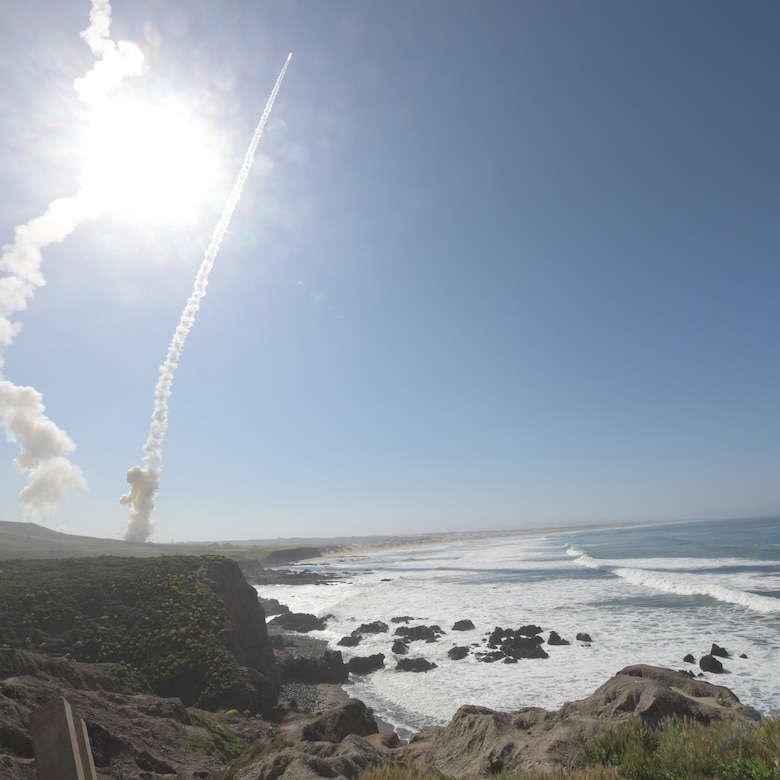
"Our reviews will assess the U.S. nuclear modernization programs to ensure that they deliver on time and are aligned with policy," Romero said. "Importantly, the reviews will include a renewed focus on strategic stability, including risk reduction and arms control."
Right now, the Defense Department is engaged in a recapitalization of the "nuclear triad," which involves new submarines, such as the Columbia-class ballistic missile submarines; new intercontinental ballistic missiles as part of the Ground Based Strategic Deterrent program; and new bomber aircraft, such as the B-21 Raider.
Modernization of that triad remains a top priority for defense leadership, Tomero said.
"There is very strong support for modernization of the triad, as Secretary Austin testified before Congress, as Deputy Secretary Hicks testified," she said. "And so that will be a high priority for our review....to ensure that we continue to modernize the triad. Of course, we'll look at how the programs are doing, what the program risks are to make sure that we have the capabilities we need when we need them."
While the president's fiscal year 2022 budget has yet to be given to Congress, Tomero did say she's aware there is support for nuclear modernization and sustaining U.S. nuclear forces, but she didn't go into more detail.
"Having a strong nuclear deterrence is one of our highest priorities," she said. "And, so, we will continue to maintain a strong and reliable nuclear deterrence, which has been the cornerstone of our national security."